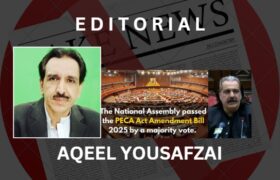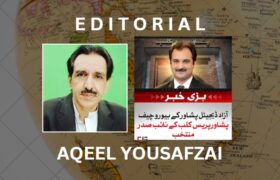Pak Economic Transformation: Political Stability is Need of the Hour
Shahzad Masood Roomi
IMF has recently released a report about Pakistan’s economic profile which presents a very bleak picture in short to midterm time period. According to report, there is a threat of mass social unrest due to inflation, slowdown in economic growth (from 6% in FY2021-22 to 2% for FY2022-23), and a pending threat of default.
The report has mentioned the ongoing political unrest in the country as the core reason behind ensuing economic crisis and fiscal  hazard of future. According to academic sources, there is a direct correlation between political instability and economic meltdown. A sample study of 113 countries by Alberto Alesina, Roubini and Swagel defines political instability as the propensity of a government to collapse. That propensity or its semblance results in lower economic growth and per capita decrease in GDP. Another study by Yi Feng, covering 96 countries between 1960 and 1980, indicates that the stable democratic regimes are likely to post sustained economic growth compared to politically unstable regimes. Moreover; another empirically researched report about Jordan from Osama D Swaidan – employing two econometric techniques: ARDL model (OLS) and Kalman filter (ML), covering the period from 1967 to 2009 — indicates that political instability has a statistically significant negative effect on economic growth. Political unrest and instability is nothing new or unique to Pakistan. It is a phenomenon commonly known in many Asian, African and even some European countries. Only difference in Pakistan’s case is that political instability cycles are more frequent. This political instability often drags the state institutions in politics as well like judiciary. This unfortunate trend has affected the judiciary’s own performance. For example, higher judiciary remains in the news due to some high profile political cases affecting all pending cases pertaining to common citizens and delaying them the justice. Another unique feature of Pakistan’s political instability is mistrust between political players. A party, when losses elections, starts agitational politics which eventually leads to political polarization in the society. It has been observed that due to such politics, governments often hesitate to take strict but mandatory fiscal decisions for the state that consequently leads to economic meltdown. Though this is not the only reason behind our economic predicament, nevertheless it remains among major causes for our economic qualms. Economic instability has been felt all over the world as a result of the European energy crisis. Governments across the world are facing serious challenges as a result of rising inflation that does not seem to be “temporary.” Food prices are increasing and countries who rely on imported food items are faced with dire economic situation. In Sri Lanka, protesters toppled central government and ruling Rajapaksas had to left office in response to the country’s ongoing economic crisis. In Peru, protestors have taken to the streets and the government there was forced to declare a state of emergency.
hazard of future. According to academic sources, there is a direct correlation between political instability and economic meltdown. A sample study of 113 countries by Alberto Alesina, Roubini and Swagel defines political instability as the propensity of a government to collapse. That propensity or its semblance results in lower economic growth and per capita decrease in GDP. Another study by Yi Feng, covering 96 countries between 1960 and 1980, indicates that the stable democratic regimes are likely to post sustained economic growth compared to politically unstable regimes. Moreover; another empirically researched report about Jordan from Osama D Swaidan – employing two econometric techniques: ARDL model (OLS) and Kalman filter (ML), covering the period from 1967 to 2009 — indicates that political instability has a statistically significant negative effect on economic growth. Political unrest and instability is nothing new or unique to Pakistan. It is a phenomenon commonly known in many Asian, African and even some European countries. Only difference in Pakistan’s case is that political instability cycles are more frequent. This political instability often drags the state institutions in politics as well like judiciary. This unfortunate trend has affected the judiciary’s own performance. For example, higher judiciary remains in the news due to some high profile political cases affecting all pending cases pertaining to common citizens and delaying them the justice. Another unique feature of Pakistan’s political instability is mistrust between political players. A party, when losses elections, starts agitational politics which eventually leads to political polarization in the society. It has been observed that due to such politics, governments often hesitate to take strict but mandatory fiscal decisions for the state that consequently leads to economic meltdown. Though this is not the only reason behind our economic predicament, nevertheless it remains among major causes for our economic qualms. Economic instability has been felt all over the world as a result of the European energy crisis. Governments across the world are facing serious challenges as a result of rising inflation that does not seem to be “temporary.” Food prices are increasing and countries who rely on imported food items are faced with dire economic situation. In Sri Lanka, protesters toppled central government and ruling Rajapaksas had to left office in response to the country’s ongoing economic crisis. In Peru, protestors have taken to the streets and the government there was forced to declare a state of emergency.
Pakistan current cycle of political instability and consequent economic meltdown began almost simultaneously months ago when the sitting government was removed constitutionally but after being ousted, it refused to accept the results and launched agitational politics. Government instead of taking required monetary actions, waited for suitable political environment and this delay proved costly. Rupee lost its value to the tone of 25% against US dollar causing massive increase in local and foreign debt and ushering waves of price hikes particularly in energy products mainly imported by the country.
On the other hand, post COVID recovery is also an issue that too is a slow process even globally, particularly when OPEC countries have capped the oil production leading to its higher prices. Despite demands from the US, OPEC has not brought the production to pre-Covid time. This is a big problem financially for countries like Pakistan that are struggling to keep their export levels steady in face of higher energy prices in the country. Unfortunately, due to political instability, successive governments failed to adjust the fuel prices according to international markets, which created huge monetary problems for the state. In order to keep their political capital intact, the previous government took popular decisions when the state was required to take the strict ones Consequently, the state’s economic security was compromised and current government had to agree on very harsh IMF conditions. But as political chaos continues, there is very little recovery in true sense. Pakistan’s economy remains precariously endangered particularly in terms of balance of payments.
There is a dire need that our political leaders should understand that without economic security, no state can remain truly sovereign and cannot avoid exploitation by the international financial institutions as and when needed. But for economic security, investors, both local and foreign must have enough confidence in any sitting government. For this to happen, there must be clearly defined and understood redlines in the politics and political narrative building by political entities. In case of failure of such realization, the political instability will continue to prognosticate bleak prospects for foreign as well as domestic investors.
Weak political culture and its relationship with a culture of political impunity from accountability due to weak democratic traditions in Pakistan remains the core structural problem of our political setup that is creating cycles of economic crises since last 75 years. The situation becomes more ominous when we consider the foreign factors contributing to internal economic challenges like the existence of panic in the commodity and financial markets; a global inflationary spiral, and rising food prices. All emerging markets are affected by the social impact of these external factors and Pakistan is no exception in this regard. Continuous political instability is only making things worse. At present, the stabilization attempts by Pakistan’s economic managers to get debt relief, concessional currency swaps and access to Chinese, Covid-19 related IMF funding quota have also been overshadowed by the current political instability.
There is no short fixes of an instrumental challenge like our economic crisis except that all stakeholders to take cognizance of the issue and play their part in restoring political stability to help national economic managers refocus on economy.





